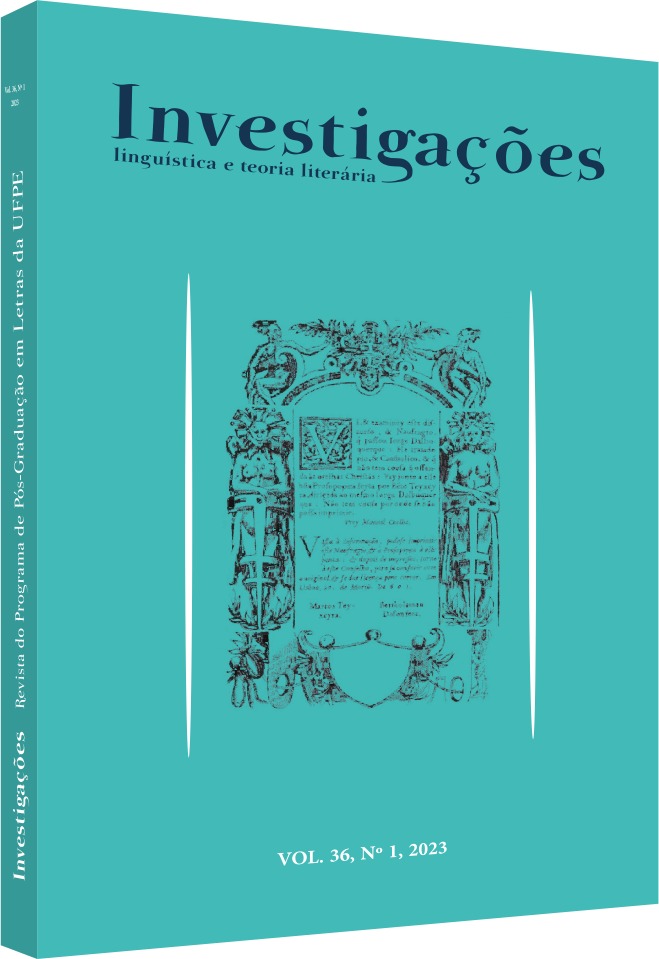Oral tradition and African ancestry in the novel Jesusalém, by Mia Couto
DOI:
https://doi.org/10.51359/2175-294x.2023.257868Keywords:
Jesusalém, Antes de nascer o mundo, Mia Couto, oral tradition, ancestryAbstract
This article shows how the aspects concerning oral tradition and African ancestry, in Jesusalém (2009), contribute to a reaffirmation of the Mozambican cultural identity. Mia Couto's novel is a post-independence narrative of political emancipation in Mozambique that problematizes and deconstructs some of the stereotypes that have historically built certain "identity paradigms" in Africa. This work is anchored in Fourshey, Gonzales and Saidi's theorizations (2019); Bhabha (2019), among others. The study allowed the understanding that the identity reconstruction of plundered societies takes place and is effective through the valorization of autochthonous traditions.
References
APPIAH, Kwame Anthony. Na casa de meu pai: a África na filosofia da cultura. Trad.: Vera Ribeiro. Rio de Janeiro: Contraponto, 2014.
APPIAH, Kwame Anthony. Na casa de meu pai: a África na filosofia da cultura. Tradução: Vera Ribeiro; revisão de tradução Fernando Rosa Ribeiro. Rio de Janeiro: Contraponto, 1997.
BHABHA, H. O local da cultura. Belo horizonte: UFMG, 2019.
CABAÇO, José Luís. Moçambique: identidade, colonialismo e libertação. São Paulo: Editora UNESP, 2009.
CABAÇO, José Luís. A questão da diferença na Literatura Moçambicana. Via Atlântica, dez. 2004.
CAVACAS, Fernanda: Mia Couto: palavra oral de sabor quotidiano/palavra escrita de saber literário. In: CHAVES, Rita: Angola e Moçambique: experiência colonial e territórios literários, São Paulo: Ateliê Editorial, 2002.
COUTO, Mia. Jesusalém. [s.l.]: Ed. Caminho, 2009.
FOURSHEY, Catherine; GONZALES, Rhonda M.; SAIDI, Christine. África bantu: de 3500 até o presente. Petrópolis: Vozes, 2019.
GILROY, Paul. O atlântico negro: modernidade e dupla consciência. São Paulo: [s.n.], 2001.
HAMPÂTÉ-BÂ, Amadou. A tradição viva. In: História Geral da África, volume I. [s.l.]: Editora Ática, Unesco, 1982. Capítulo 8.
KILOMBA, Grada. Memórias da plantação: episódios de racismo cotidiano. Trad.: Nuno Quintas. Ed.: Orfeu Negro, 2020.
LEITE, Ana Mafalda. Oralidades & escritas pós-coloniais: estudos sobre literaturas africanas. Rio de Janeiro: EdUERJ, 2020.
LEITE, Ana Mafalda. A sagração do profano: reflexões sobre a escrita de três autores moçambicanos: Mia Couto, Rui Knopli e José Craveirinha. In. Vértice, II / julho - agosto de 1993.
MBEMBE, Joseph AchiIIe. Necropolítica: biopoder, soberania, estado de exceção, política da morte. Trad.: Renata Santini. São Paulo: n-1 edições, 2018.
NOA, Francisco. Perto do fragmento, a totalidade: olhares sobre a literatura e o mundo. São Paulo: Editora Kapulana, 2015.
ROSÁRIO, Lourenço do. Moçambique: história, cultura, sociedade e literatura. Belo Horizonte: Nadyala, 2010.
SECCO, Carmen Lucia Tindó. A magia das letras africanas: ensaios sobre as literaturas de Angola e Moçambique e outros diálogos. 2. ed. Rio de Janeiro: Quartet, 2008.
SOUZA, Elio Ferreira de. Poesia negra: Solano Trindade e Langston Hughes. Curitiba: Appris, 2017.
SOW, Alfa I; ABDULAZIZ, Mohamed H. Língua e evolução social. In: História Geral da África, volume VIII. [s.l.]: Editora Ática, Unesco, 2010. Capítulo 18.
VANSINA, J. A tradição oral e sua metodologia. In: História Geral da África, volume VIII. [s.l.]: Editora Ática, Unesco, 2010. Capítulo 7.
Downloads
Published
How to Cite
Issue
Section
License
Copyright (c) 2023 Keiliane da Silva Araújo Carvalho

This work is licensed under a Creative Commons Attribution 4.0 International License.
Authors who publish with Revista Investigações agree to the following terms:
Authors retain copyright and grant the journal right of first publication with the work simultaneously licensed under the Creative Commons Attribution 4.0 International (CC BY 4.0) license that allows others to share the work with an acknowledgement of the work's authorship and initial publication in this journal.
Authors are able to enter into separate, additional contractual arrangements for the non-exclusive distribution of the journal's published version of the work (e.g., post it to an institutional repository or publish it in a book), with an acknowledgement of its initial publication in this journal.
You are free to:
Share — copy and redistribute the material in any medium or format for any purpose, even commercially.
Adapt — remix, transform, and build upon the material for any purpose, even commercially.
The licensor cannot revoke these freedoms as long as you follow the license terms.
Under the following terms:
Attribution — You must give appropriate credit , provide a link to the license, and indicate if changes were made . You may do so in any reasonable manner, but not in any way that suggests the licensor endorses you or your use.
No additional restrictions — You may not apply legal terms or technological measures that legally restrict others from doing anything the license permits.

